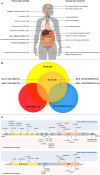Atypical Presentations of IPEX: Expect the Unexpected
- PMID: 33614561
- PMCID: PMC7892580
- DOI: 10.3389/fped.2021.643094
Atypical Presentations of IPEX: Expect the Unexpected
Abstract
Immune dysregulation, polyendocrinopathy, and enteropathy, X-linked (IPEX) syndrome is a rare disorder that has become a model of monogenic autoimmunity. IPEX is caused by mutations in FOXP3 gene, a master regulator of regulatory T cells (Treg). Cases reported in the last 20 years demonstrate that IPEX clinical spectrum encompasses more than the classical triad of early-onset intractable diarrhea, type 1 diabetes (T1D) and eczema. Atypical cases of IPEX include patients with late-onset of symptoms, single-organ involvement, mild disease phenotypes or rare clinical features (e.g., atrophic gastritis, interstitial lung disease, nephropathy etc.). Several atypical presentations have recently been reported, suggesting that IPEX incidence might be underestimated. Immunosuppression (IS) treatment strategies can control the disease, however at the moment allogeneic hematopoietic stem cell transplantation (HSCT) is the only available definitive cure, therefore it is important to achieve a prompt diagnosis. This review aims to describe unusual clinical phenotypes, beyond classical IPEX. Overall, our analysis contributes to increase awareness and finally improve diagnosis and treatment intervention in IPEX in order to ensure a good quality of life.
Keywords: FOXP3; IPEX; immune dysregulation; primary immunodeficiencies; regulatory T cells.
Copyright © 2021 Consonni, Ciullini Mannurita and Gambineri.
Conflict of interest statement
The authors declare that the research was conducted in the absence of any commercial or financial relationships that could be construed as a potential conflict of interest.
Figures

Similar articles
-
Hematopoietic stem cell transplantation recovers insulin deficiency in type 1 diabetes mellitus associated with IPEX syndrome.Pediatr Diabetes. 2019 Nov;20(7):1035-1040. doi: 10.1111/pedi.12895. Epub 2019 Jul 24. Pediatr Diabetes. 2019. PMID: 31322807
-
Immune dysregulation, polyendocrinopathy, enteropathy, x-linked syndrome: a paradigm of immunodeficiency with autoimmunity.Front Immunol. 2012 Jul 31;3:211. doi: 10.3389/fimmu.2012.00211. eCollection 2012. Front Immunol. 2012. PMID: 23060872 Free PMC article.
-
Case report: Dupilumab treatment improved type 2 disorders in a patient with IPEX syndrome diagnosis.Front Immunol. 2023 Jan 11;13:995304. doi: 10.3389/fimmu.2022.995304. eCollection 2022. Front Immunol. 2023. PMID: 36713411 Free PMC article.
-
IPEX Syndrome: Improved Knowledge of Immune Pathogenesis Empowers Diagnosis.Front Pediatr. 2021 Feb 22;9:612760. doi: 10.3389/fped.2021.612760. eCollection 2021. Front Pediatr. 2021. PMID: 33692972 Free PMC article. Review.
-
Immune dysregulation, polyendocrinopathy, enteropathy, X-linked (IPEX) syndrome: A systematic review.Autoimmun Rev. 2020 Jun;19(6):102526. doi: 10.1016/j.autrev.2020.102526. Epub 2020 Mar 29. Autoimmun Rev. 2020. PMID: 32234571
Cited by
-
Too much of a good thing: a review of primary immune regulatory disorders.Front Immunol. 2023 Oct 31;14:1279201. doi: 10.3389/fimmu.2023.1279201. eCollection 2023. Front Immunol. 2023. PMID: 38022498 Free PMC article. Review.
-
FOXP3 recognizes microsatellites and bridges DNA through multimerization.Nature. 2023 Dec;624(7991):433-441. doi: 10.1038/s41586-023-06793-z. Epub 2023 Nov 29. Nature. 2023. PMID: 38030726 Free PMC article.
-
Clinical and immunological characteristics of five patients with immune dysregulation, polyendocrinopathy, enteropathy, X-linked syndrome in China-expanding the atypical phenotypes.Front Immunol. 2022 Aug 24;13:972746. doi: 10.3389/fimmu.2022.972746. eCollection 2022. Front Immunol. 2022. PMID: 36091011 Free PMC article.
-
Rare immune diseases paving the road for genome editing-based precision medicine.Front Genome Ed. 2023 Feb 8;5:1114996. doi: 10.3389/fgeed.2023.1114996. eCollection 2023. Front Genome Ed. 2023. PMID: 36846437 Free PMC article. Review.
-
ALPS, FAS, and beyond: from inborn errors of immunity to acquired immunodeficiencies.Ann Hematol. 2022 Mar;101(3):469-484. doi: 10.1007/s00277-022-04761-7. Epub 2022 Jan 20. Ann Hematol. 2022. PMID: 35059842 Free PMC article. Review.
References
Publication types
LinkOut - more resources
Full Text Sources
Other Literature Sources
Medical

